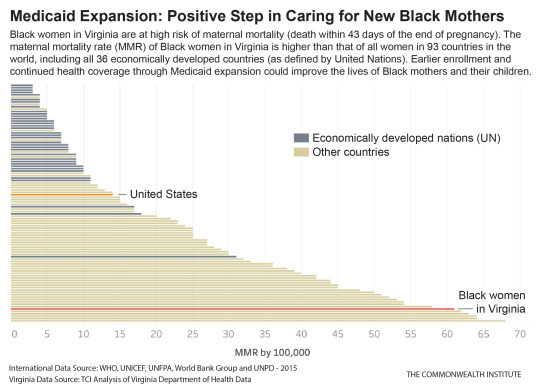July 2, 2018
Next Steps for Medicaid Expansion To Help Black Mothers in Virginia
Black women in the United States are 3.4 times more likely than White women to die during pregnancy or within one year of pregnancy. These outcomes for pregnancy-related deaths are even worse in Virginia. The passage of Medicaid expansion provides an opportunity to help combat this pressing issue by providing coverage to more mothers and ensuring continued coverage to recent mothers formerly in the coverage gap – if the state makes the health care needs of this population a priority. Simply providing coverage is not enough. Health care providers will need to better address the unique health needs of Black women and the challenges Black women encounter when accessing mental and physical care.
While Virginia’s Medicaid program has covered eligible pregnant mothers up to two months after birth, the newly increased eligibility mean that many new mothers will be able to continue having health insurance after those two months, rather than falling into a coverage gap – not eligible for Medicaid and not making enough money to qualify for subsidies through the federal marketplace. This an important step given that, according to one recent report, almost 1 in 5 of all pregnancy-related deaths occur 43 days to a year after birth.
To make the most of this opportunity, Virginia policymakers should ensure that all newly eligible Virginians, particularly those with the highest need of care, are able to easily enroll. And all people in Virginia should have access to practitioners and providers who are knowledgeable in how people’s experiences may impact their health and respond accordingly.
According to UNICEF, the United States is ranked 46th in maternal mortality in the world, which is a more narrow definition than pregnancy-related deaths and extends only up to 42 days after the end of pregnancy. The United States ranks 33rd out of 36 countries with developed economies. In the state of Virginia in 2015, while Black mothers gave birth to nearly 1 out of 5 children (approximately 21,000 of 103,000 live births), Black women accounted for more than 1 out of 3 maternal deaths (13 out of 32). Calculated to fall in line with UNICEF reporting rates, there were 61 deaths per 100,000 live births for Black women in Virginia. This means that Black women in the commonwealth have a higher rate of maternal mortality than all women in 93 countries in the world.

For a live version of this map with country-specific information, click here.
Black women more often experience a lower quality of health care compared to their White counterparts. Additionally, the experience of discrimination and the stress associated with it, including while accessing health care, has been shown to lead to poorer health outcomes for mothers and their children during pregnancy. One recent study finds 32 percent of Black women said that they personally had been discriminated against because of their race when going to a doctor or health clinic, while 22 percent said they have avoided going to a doctor or seeking health care out of concern they would be racially discriminated against. In addition to potentially causing negative health outcomes for patients, these experiences create a barrier to accessing timely and regular health care. Making it a state priority to provide inclusive medical services to diverse populations would benefit thousands of Black Virginia families and provide a safe place for expecting mothers of color to receive quality medical treatment.
Increased access to health care for women of reproductive age can be critical even before a pregnancy. That’s because it helps to identify and manage long-term conditions such as hypertension, obesity, and diabetes that can make childbirth more risky and lead to complications. This is especially true for Black women who have been found to be at high risk of developing these conditions due to a combination of genetic and social factors. This early intervention can prove crucial due to the fact that almost a quarter of all maternal deaths are due to cardiovascular diseases and cardiomyopathy (a heart disease that can be caused by obesity and high blood pressure).
Maternal depression is also a high priority concern. Black mothers are less likely to receive mental health services. Depression is treatable and Medicaid expansion can be an important step forward in helping Virginia mothers access mental health care. The implementation of culturally responsive practices is critical for making sure Black mothers can fully benefit from this expansion of coverage.
Medicaid expansion is a massive step forward in improving the lives of nearly 400,000 Virginians, including new mothers. This process can be strengthened by a thoughtful and targeted campaign to enroll and actively provide quality, culturally responsive health care to Black women in Virginia. The physical and mental health of this population before, during, and after childbirth is crucial to the successful implementation of Medicaid expansion. By covering more women of childbearing age and providing lasting coverage, we can improve our dismal record in caring for Black mothers.
Category:
Health Care
